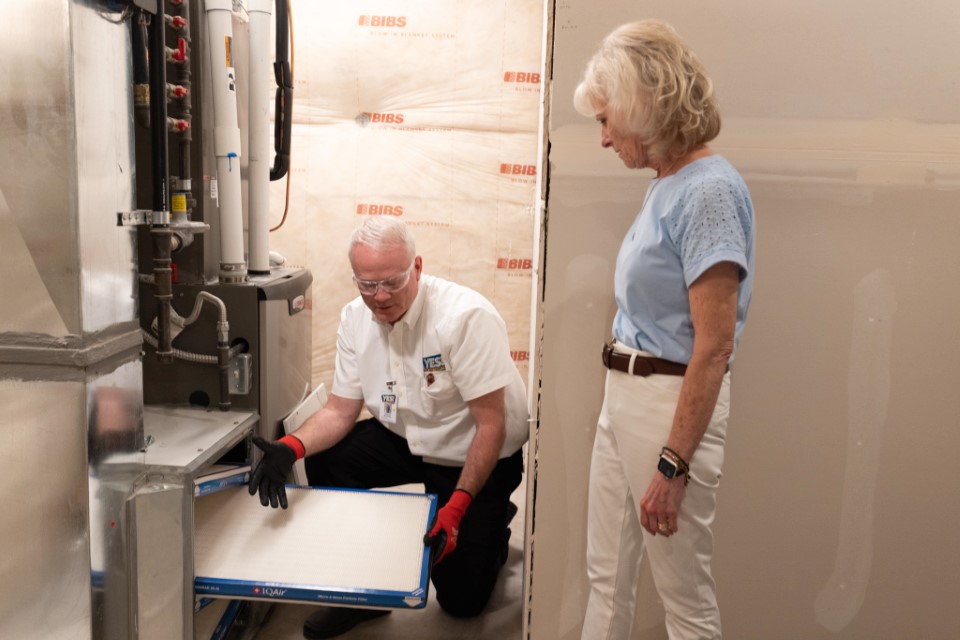How Often Should You Change Your Furnace Filter?
May 04, 2023

As a general rule, furnace filters should be replaced around every three months. But in truth, how often you should change your furnace filter also depends on multiple factors. These include:
- The Indoor Air Quality: Filters can quickly become clogged if air quality is always an issue (as it often is in Utah).
- How Often the Furnace Is Used: The more frequently air is cycled through the furnace, the more likely pollutants will accumulate in the filter.
- The Type of Filter Installed: Some furnace filter types last longer than others, so you’ll need to replace them less often.
- If You Have Pets or Not: Dogs, cats, and other furry critters can shed fur and dander, which could circulate in the indoor air and get caught by the filters.
You can also contact our furnace technicians for an annual tuneup! Our technicians check your entire system and offer recommendations on how often you should change a furnace air filter.
Why Are Furnace Filters Important?
Furnace filters are critical to the operation of your furnace because they capture dust, dirt, dander, and other airborne contaminants. They keep these impurities out of your heating system, where they might accumulate and hinder airflow, causing damage to components such as the blower fan. Additionally, it helps you save money by reducing how often you need to clean your furnace.
And, while the filters are primarily used to keep dirt out of the furnace, they also contribute to the overall quality of your home’s interior air, essentially cleaning the air as it cycles through your house.
Can You Run Your Furnace Without a Filter?
While you could run a furnace without installing a filter, it would be best if you do it only when you need to turn it on. Without a filter, there won’t be anything to stop contaminants from getting into your heating system and circulating back into your home.
Signs the Furnace Filter Needs Changing
Apart from checking on the furnace filters to see if they’re dirty, here are a few more things to watch out for when they need to be replaced:
Rooms Take Longer to Heat Up
A clogged filter restricts the amount of air that can enter the furnace. As a result, the furnace will have less air to heat and circulate throughout your home. It will take significantly longer for your home’s indoor spaces to attain the desired temperature.
The Furnace Is Running Too Frequently
HVAC thermostats typically activate the furnace when the indoor temperature is colder than desired. Since your home takes longer than usual to warm up, your furnace would have to turn on more often. You might notice your heating bills increasing if this happens.
Your Home is Dusty
When the filter becomes too clogged, dust and other pollutants are pulled into the furnace along with the air and spread indoors. Over time, you might notice that your home keeps getting dusty even if you’ve recently cleaned.
Types of Home Furnace Filters
Besides knowing how often you should change the filter on the furnace, it also helps to learn the different filters that you can replace your current one with. Here are the main types and their advantages and disadvantages.
Fiberglass
Fiberglass filters are made from fiberglass fibers spun together and typically cost less than $5. They’re able to filter out larger contaminants such as lint, dust, and bits of debris. Although fiberglass filters are cheap, they can’t protect your furnace from smaller pollutants like smoke particles. They’re also expected to only last up to a month before they need replacing.
Polyester
Polyester furnace filters are typically four times as expensive as fiberglass filters. But you won’t need to buy another one for three months. These filters can also block out particles smaller than dust, like pollen. Polyester is a cheaper filter option for those with asthma and other respiratory issues.
Electrostatic
Electrostatic filters use static electricity to attract and trap pollutants from the air. They come in disposable and permanent types. Disposables last for around the same time as polyester filters. Meanwhile, permanent filters can be washed and reused for around eight years.
Electrostatic filters can catch smaller contaminants like dander and smoke particles and thus work well for homeowners who smoke or have pet allergies. However, the static charge isn’t always as effective with larger particles like dust and mold, which won’t make this type suitable for people with respiratory problems.
Pleated
Pleated filters are extremely dense and effective in capturing many smaller particles such as mites and spores. As a result, they’re an excellent alternative for anyone who suffers from allergies, respiratory issues, or a weakened immune system.
Their density, on the other hand, makes it even more difficult for air to flow freely through, especially when they’re dirty. It will make your furnace work significantly harder to heat your home—even more than with other types of clogged filters.
Reusable vs. Disposable: Which Filter Is Best For You?
Reusable and disposable furnace filters each have their pros and cons. Changing to a reusable filter typically costs more initially, but you’ll save more in the long run because you don’t have to buy a replacement anytime soon. However, you’ll still need to take them out and have them cleaned every few months or so, depending on how quickly they clog up.
On the other hand, disposable filters are much cheaper and save you from having to clean them. But you’ll also have to buy and install a new one regularly, which could cost you more in the long run. We typically recommend disposable pleated filters as the best balance for most homeowners.
Is a Thicker Furnace Filter Always Better?
Thicker furnace filters (anything more than 1-2 inches thick) typically last longer than thinner filters and can save you money in the long term. This is because they have more material for catching pollutants which means they won’t clog up as quickly. Depending on how thick the filter is, you might not even have to replace it for up to a year.
However, you should still check your heating system’s guide for its maximum filter thickness. You could also have an HVAC technician take a look at your furnace.
Learn More about Furnace Maintenance with Yes!
Want to know more about furnace maintenance than just how often you should change your furnace filter? Call our team at 844-216-9300 and speak with a technician today.
